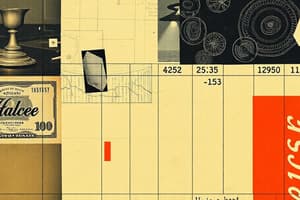Podcast
Questions and Answers
Which of the following is true about the balance sheet?
Which of the following is true about the balance sheet?
- It does not need to balance
- It shows a company's financial position at a specific point in time (correct)
- It is not an important tool for understanding a company's financial health.
- It only includes assets.
What does the accounting equation state?
What does the accounting equation state?
- Total assets = total equity
- Total assets = total liabilities + total equity (correct)
- Total liabilities = total assets + total equity
- Total equity = total liabilities
What is the main difference between current and non-current assets?
What is the main difference between current and non-current assets?
- Current assets generate income for the company over a number of years
- Non-current assets are used up or sold within one year
- Current assets are longer term in nature
- Non-current assets are expected to be converted into cash within one year (correct)
What does the accounting equation represent?
What does the accounting equation represent?
What is the purpose of fair value accounting?
What is the purpose of fair value accounting?
Which of the following is an example of non-current assets?
Which of the following is an example of non-current assets?
What does the balance sheet indicate about a company's financial health?
What does the balance sheet indicate about a company's financial health?
What is a company's operating period?
What is a company's operating period?
How are resources available for generating profit represented on the balance sheet?
How are resources available for generating profit represented on the balance sheet?
Flashcards are hidden until you start studying
Study Notes
- The balance sheet shows a company's financial position at a specific point in time.
- It includes assets, liabilities, and shareholders' equity.
- The accounting equation is total assets = total liabilities + total shareholders' equity.
- Total assets represent resources available for generating profit.
- Liabilities and equity indicate how those resources are financed.
- The balance sheet must balance.
- Many assets are reported at historical cost.
- Fair value accounting is only applied to a few assets.
- Most companies report assets at historical cost.
- The balance sheet is an important tool for understanding a company's financial health.
Studying That Suits You
Use AI to generate personalized quizzes and flashcards to suit your learning preferences.




